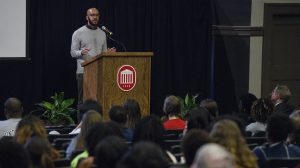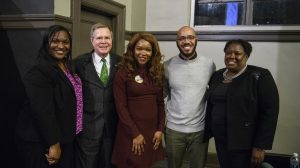
National Poetry Slam champion Clint Smith shares his original ‘spoken word’ meditations during the keynote address for Black History Month at the University of Mississippi. Photo by Thomas Graning/Ole Miss Communications
OXFORD, Miss. – With wit and wisdom, National Poetry Slam champion Clint Smith shared historic truths and personal meditations about being black in America with a responsive audience Monday (Feb. 26) at the University of Mississippi.
Using the popular “spoken word” format, Smith delivered the keynote address as annual Black History Month observances came to a close. Speaking before a capacity audience in Fulton Chapel, the World Poetry Slam finalist said America, and particularly the South, is filled with “complex dualities and multiple truths” that create an uncomfortable reality that will not diminish simply by motivational rhetoric and wishful thinking alone.
“We’re in a unique place when it comes to race and racism in this country,” Smith said. “In many ways, Oxford is a microcosm of what is happening nationwide.”
Citing the United States’ long and complicated history before, during and after the Atlantic slave trade, Smith offered his reflections on a myriad of subjects. Topics addressed in his poetry ranged from uncomfortable conversations African-American parents have with their sons to unflattering facts about past presidents who owned slaves and the real motives behind the New Deal.
“Oppression does not disappear just because you removed those chapters in our history books and refuse to talk about it,” he said. “Racial stratification is not an accident.”
While the recent removals of Confederate statues in cities around the national is a major victory, Smith said such milestones cannot and should not be the end of efforts to improve conditions for minorities.
“Things don’t change on their own, without pressure or quickly,” Smith said. “Often, significant change doesn’t occur until generations later.
“We must keep banging on the closed doors because we never know when opportunities will open – not just for ourselves, but for those who will benefit after us.”
Receiving finger snaps, a sign of approval among spoken word enthusiasts, and two standing ovations, the speaker’s passionate appeals for activism drew positive responses from those in attendance.
“Black History Month is important throughout the nation, but perhaps especially important here at the University of Mississippi,” Chancellor Jeffrey Vitter said. “We have taken many positive steps to recognize our past, embrace forward-thinking attitudes, and support inclusion and diversity.

Keynote speaker Clint Smith (second from right) is welcomed to the UM campus by (from left) Shawnboda Mead, director of the Center for Inclusion and Cross Cultural Engagement; Chancellor Jeffrey Vitter; Nekitta Beans, Black Student Union president; and Katrina Caldwell, vice chancellor for diversity and community engagement. Photo by Thomas Graning/Ole Miss Communications
“We must keep doing so because embracing different ideas and perspectives makes us a stronger community, because it prepares our students to become engaged citizens and because it’s deeply tied to our central mission – our purpose – as an institution of higher learning.
Shawnboda Mead, director of the university’s Center for Inclusion and Cross Cultural Engagement, said the committee hopes Smith’s presentation provided a memorable experience for everyone in attendance.
“As our university strives to be a leader in racial reconciliation and inclusivity, this year’s keynote address is a continuation of our educational effort,” Mead said.
A published writer, award-winning teacher and doctoral candidate at Harvard University, Smith has taught high school in Prince George’s County, Maryland. He has spoken at the U.S. Department of Education, the IB Conference of the Americas and the Joint Center for Political and Economic Studies, and has been featured on TED.com, Upworthy and TVOne.
Sponsors were the Center for Inclusion and Cross Cultural Engagement, University Lecture Series, Office of the Chancellor, Office of the Vice Chancellor for Diversity and Community Engagement, Department of Intercollegiate Athletics, the Associated Student Body, Department of Student Housing, Sally McDonnell Barksdale Honors College, School of Education, Arch Dalrymple III Department of History, Department of Sociology and Anthropology, Department of African American Studies, National Pan-Hellenic Council and the Black Student Union.